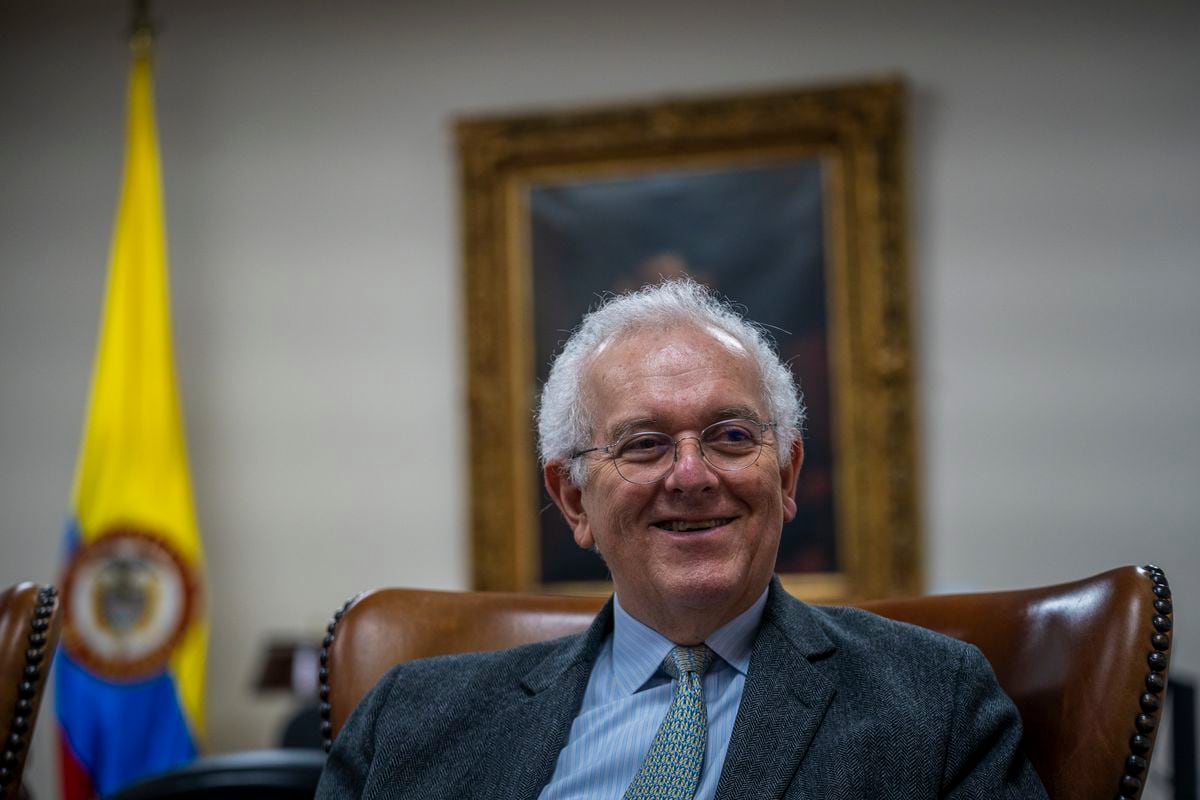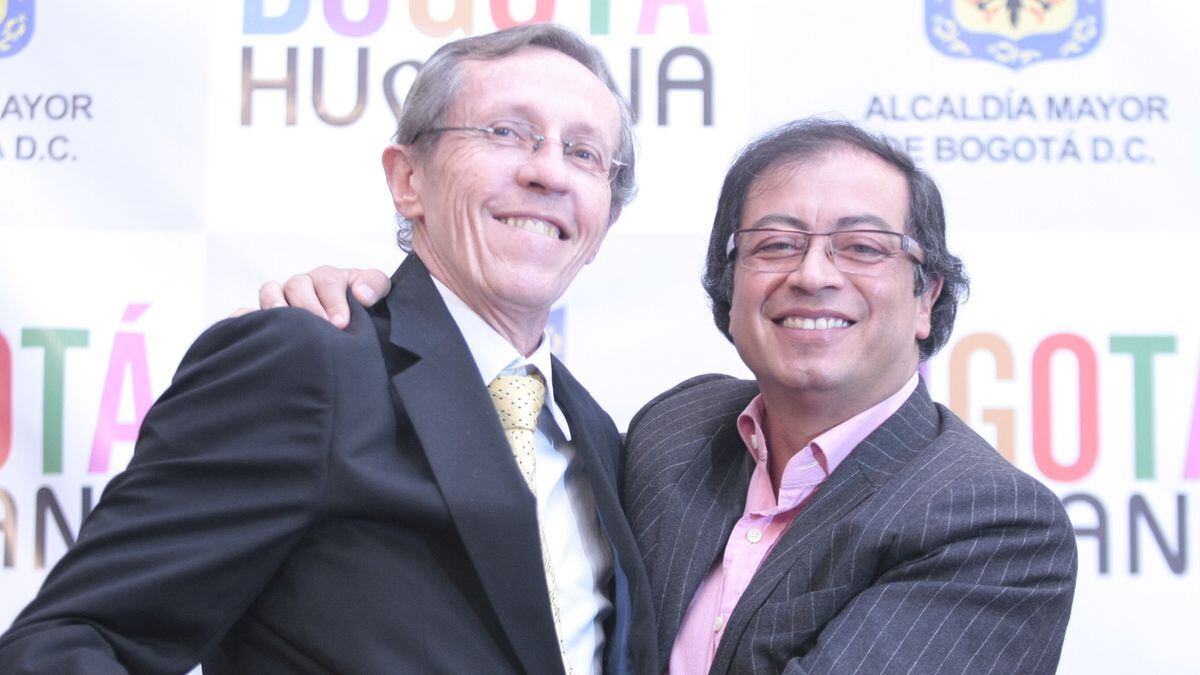José Antonio Ocampo (Cali, 69 years old) smiles.
He talks about the challenges of the Colombian economy, his differences with his fellow cabinet members, the fiscal deficit or the exchange rate, and smiles.
Being Gustavo Petro's Finance Minister who structured and carried out a tax reform that promises to bring collections closer to Latin American standards gives reason to smile.
But managing the finances of a country that promises little growth next year, which has a high fiscal deficit and a parallel current account deficit, a highly devalued currency and unemployment above 10%, could erase the smile of more than one.
Not so that of this professor from Columbia University who receives EL PAÍS in his office, says that they have been the worst four months of his life and that although he misses New York, in Bogotá he eats very well.
Q.
How have you felt as a minister after spending several years in the academy?
R.
They have been the hardest four months of my life, with a lot of heavy work.
This is due to the intensity of the political environment, which on the one hand has been positive for the Government, such as the support in Congress that unanimously voted for the royalties budget and in which the tax reform passed the Senate with three votes in favor of each one against, and in the House pro four to one.
But, on the other hand, consensus has been difficult to achieve.
In addition, as the person in charge of the relationship with the markets in quotes, there have been some hard, difficult weeks, although in the end we have succeeded in calming the markets.
Q.
Speaking of the markets, do you think that with the tax it is viable to recover the investment grade?
A.
Getting it back is a matter of two or three years, hopefully.
In my meetings with the rating agencies that removed Colombia's investment grade under the previous government, they tell me that they expect to see the results next year.
They won't change before.
If one of them improves the
outlook for the country from stable to positive, it would be a success.
Q.
Your latest achievement?
Is your Columbia license expiring next year?
R.
I have a public service license, which is for one year and can be extended for a maximum of two years.
They may talk me out of college, but it's hard (laughs).
Q.
Well, what comes next in terms of economic policy after the tax?
R.
The big issue is the development plan that the Government has to present to Congress in
february.
We have to work on what is the budget that can be financed for the four years and formulate priorities.
The bases that have already been presented can be modified.
We are going to see how the results of the regional dialogues are integrated.
Q.
How do you see the economic outlook for next year?
Data such as the Indicator for Monitoring the Economy already show symptoms of the slowdown
R.
I see it difficult in one sense, and less difficult in another.
The positive thing is that there will be less inflation and interest rates will also drop, and they are two of the main headaches this year.
The negative will be economic activity, which will certainly be lower.
The indicators, the Fedesarrollo opinion polls, all already show some sign of weakening.
Although that is part of an international trend from which we cannot isolate ourselves.
Q.
In recent days a Goldman Sachs report says that the United States will not do so badly, the OECD shows Colombia growing by more than 1%. Have your forecasts changed?
R.
We maintain the forecast of Banco de la República, 0.5%, and the Ministry works with 1%.
The most positive are the World Bank, the International Monetary Fund and ECLAC, which forecast around 2%.
I see four positive factors to grow 2% or even a little more.
The first is that real wages will increase due to the drop in inflation, the opposite of this year, and that will boost demand, and popular demand.
The second is that interest rates should begin to fall and this alleviates the burden on investment or households with consumer or housing debt.
The third is non-traditional exports, those other than coffee and hydrocarbons, which that year have grown 23% as of September, helped by the opening of the border with Venezuela.
Q.
You talk about wages, how is the discussion of the minimum wage going?
Q.
It's just starting, there's not much to say yet.
The rule is that what increases inflation plus productivity rises.
Productivity is measured by DANE, and it has not yet given the data, and inflation we still do not know.
We hope that in November the data will show the beginning of the fall.
I think October was the worst month.
Q.
But what is coming is the slowdown...
R.
Yes. Now, growth was so strong this year -more than expected- that even if it grows 1% in 2023 and compared to 2019, before the pandemic (to remove the fall and recovery), Colombia is going to show very positive economic activity, we are going to be one of the best examples in the world.
That's important because if that happens, the job hit will be less severe than some people fear.
Q.
What is your plan to face the fiscal and external deficits?
R.
The first thing is that I do not believe in the theory of twin deficits, that one feeds the other.
There is a third factor that people ignore, the surplus or deficit of the private sector, which is counted in the external deficit and is not irrelevant.
So I analyze them separately.
Both are going to improve next year, and for credit rating agencies that is the most important thing of all.
In the case of the fiscal, including the Fuel Price Stabilization Fund, we plan to lower it from 7.1% of GDP this year to 4.3%.
It's a strong fit.
Q.
How do you do that in a difficult year?
A.
With several factors.
It impacts last year's tax reform, which applies to this year's activity for an income tax that is paid in 2023. With two additional elements: economic growth this year has been strong, even for oil and coal companies, and our tax increase for these companies will only take effect in 2024. The other thing is that the fight against evasion is being effective.
Q.
Does the impact of the devaluation affect the debt service?
R.
The external debt is increasing in pesos as a percentage of GDP;
That will depend on the exchange rate.
But the positive effect is that a new debt in dollars gives us more pesos.
Q.
Doesn't spending on debt payment also increase?
R.
There were some negative effects that are being compensated.
For a few weeks, the turbulence in the markets affected us negatively, since the interest rate of the TES, the government debt securities, increased by almost 250 basic points.
The markets have been calming down and we are down almost 200 basis points.
This positive trend is going to be important when we place TES again, because when it went up so much we stopped issuance.
We closed for this year because we had enough funding.
Let's hope that inflation goes down so that the rates at which we place that debt also go down.
The trust that has been generated in the markets is one of my great successes.
Q.
And what is one of your great challenges?
R.
The economic growth of the coming year.
Another is to reduce the fiscal deficit by almost 3%, one of the largest fiscal adjustments in history to comply with the fiscal rule.
And also lower the deficit in the balance of payments, which this year will be almost close to 6% of GDP and our objective is to lower it to 4% with exports as a factor of economic growth.
Q.
With such challenges, what do you think is the greatest risk for the economy?
R.
The two deficits.
Next year is going to be a difficult year.
Q.
You and the Government have talked about protecting the national industry, for example, in your proposal for a day without VAT in the tax or with the increase in tariffs.
A.
There is not a policy of protection but of promotion of the national industry.
Protection were only the increases in tariffs on clothing and shoes, but in no other sector is there talk of significantly increasing protection.
The idea is to promote new productive activities, which in government jargon we call reindustrialization.
Q.
That policy, in the president's speech, is closely linked to the energy transition. Is there already a clear path, a plan?
R.
Be careful, we are not talking about the entire extractive industry.
When I talk to foreign investors, for example, Colombia is seen as an important source of copper production, which is going to boom with the energy transition.
Not in the short term, but Colombia could become a major copper exporter.
There is no discussion about gas: we want to be self-sufficient.
The theme is oil and coal.
About them, the Ministry of Mines and Energy is finishing an evaluation of what reserves can be achieved with the contracts already signed.
Based on that we will see if more contracts are needed.
Q.
What is the horizon to know if they are needed?
Maintain current production?
R.
In gas, increase it;
in oil at least maintain it, at least during the transition period.
Another essential part is to achieve the export transition: at what speed can we replace oil?
I see a horizon of about 15 years like the coffee transition, which took place from the mid-50s of the 20th century to the early 70s. In addition, there will be less international demand for coal, especially, and for oil.
Then we will also see that other transition, of demand.
Q.
In this transition of the economy, have you checked if there is something a total peace dividend?
What would be the effect of total peace on the economy?
R.
There is an effect on the confidence of foreigners.
Investors, but also tourism like the one that generated the agreement with the Farc.
One of the great potentialities of
country is ecotourism, and ecotourism requires peace.
But we have not done studies.
Q.
Next year comes the pension discussion.
R.
Yes. It is an open discussion that is the Ministry of Labor.
We are going to see what the proposals are, how we can arrange them and have a proposal that is fiscally viable.
This country has a tradition of fiscal responsibility.
This government is not going to break fiscal responsibility.
Furthermore, it is hard for us because we have to comply again with the fiscal rule when the last government had three years without it having to do so due to the pandemic, and at the same time make the financed changes.
Q.
There is always pressure on finance ministers to give more money to other sectors. Do you feel that your colleagues understand this, when some of them have no track record in public office?
R.
That is always a complex issue, because we are the ones with the scissors.
It is part of our function.
You have to respond to the demands, but within the limits of what is possible.
Q.
Is that the most difficult thing to negotiate in the Government or is there something that has cost you particular work?
R.
Obviously, the policies announced by some colleagues must be discussed and wonder how much it costs.
With the resources we have, what the heck can we do to meet the goal of change (to use the government's terminology)?
Q.
And what is the most difficult thing to negotiate with the president?
R.
With the president one understands each other.
Obviously he has some very ambitious goals that he launched on the campaign.
So we see what can be done from here and how it can be done gradually.
Do not do it all next year, but in the four-year period.
Same as with cabinet colleagues.
Subscribe here
to the EL PAÍS newsletter on Colombia and receive all the latest information on the country.







/cloudfront-eu-central-1.images.arcpublishing.com/prisa/SD75LX5OYJHF7H7TKLOMS5ZSNM.jpg)
/cloudfront-eu-central-1.images.arcpublishing.com/prisa/ZHBM2UJTXJEMFAJJLPXP2OGBRQ.jpg)




/cloudfront-eu-central-1.images.arcpublishing.com/prisa/KMEYMJKESBAZBE4MRBAM4TGHIQ.jpg)

